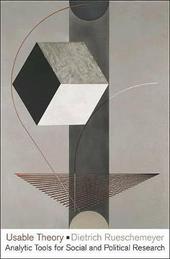
|
Usable Theory: Analytic Tools for Social and Political Research
Paperback / softback
Main Details
| Title |
Usable Theory: Analytic Tools for Social and Political Research
|
| Authors and Contributors |
By (author) Dietrich Rueschemeyer
|
| Physical Properties |
| Format:Paperback / softback | | Pages:352 | | Dimensions(mm): Height 235,Width 152 |
|
| ISBN/Barcode |
9780691129594
|
| Classifications | Dewey:320.072 |
|---|
| Audience | | Postgraduate, Research & Scholarly | | Professional & Vocational | |
|---|
|
Publishing Details |
| Publisher |
Princeton University Press
|
| Imprint |
Princeton University Press
|
| Publication Date |
23 August 2009 |
| Publication Country |
United States
|
Description
The project of twentieth-century sociology and political science--to create predictive scientific theory--resulted in few full-scale theories that can be taken off the shelf and successfully applied to empirical puzzles. Yet focused "theory frames" that formulate problems and point to relevant causal factors and conditions have produced vibrant, insightful, and analytically oriented empirical research. While theory frames alone cannot offer explanation or prediction, they guide empirical theory formation and give direction to inferences from empirical evidence. They are also responsible for much of the progress in the social sciences. In Usable Theory, distinguished sociologist Dietrich Rueschemeyer shows graduate students and researchers how to construct theory frames and use them to develop valid empirical hypotheses in the course of empirical social and political research. Combining new ideas as well as analytic tools derived from classic and recent theoretical traditions, the book enlarges the rationalist model of action by focusing on knowledge, norms, preferences, and emotions, and it discusses larger social formations that shape elementary forms of action. Throughout, Usable Theory seeks to mobilize the implicit theoretical social knowledge used in everyday life. * Offers tools for theory building in social and political research * Complements the rationalist model of action with discussions of knowledge, norms, preferences, and emotions * Relates theoretical ideas to problems of methodology * Situates elementary forms of action in relation to larger formations * Combines new ideas with themes from classic and more recent theories
Author Biography
Dietrich Rueschemeyer is professor emeritus of sociology at Brown University and a research professor at Brown's Watson Institute for International Studies. He is the author of "Power and the Division of Labor" and the coeditor of "Bringing the State Back In", among many other books.
Reviews"Rueschemeyer's book is promising as the foundation to produce a literature review and the subsequent drawing of hypotheses... This is valuable to the researcher approaching the field of study for the first time and looking for a basic framework."--Richard Arnold, Teaching Sociology "Drawing on his experience teaching classical and modern theory over several decades, Dietrich Rueschemeyer has written a very practical book that aims to provide a catalogue of usable theory... Although the book is meant to aid undergraduate and graduate students in formulating their research projects, it also might be of interest to seasoned sociologists who want to examine the degree to which their own inclusions and exclusions overlap with those found in this book."--G. William Domhoff, American Journal of Sociology "Usable Theory is nothing less than Amazonian in its detail and complexity... Usable Theory is therefore not very well suited to undergraduates, whom it is more likely to confound than enlighten, but it is nevertheless an important book that should be read by advanced students of politics and established social scientists alike."--Daniel Falkiner, Political Studies Review "The well-written, easy to follow arguments would make this book useful in postgraduate upper-level theory and/or methods courses... Usable Theory ... provide[s] a starting point for effective utilization of theory in social research. From this perspective, it deserves a spot on any researcher's shelf."--Jason L Weigle, Sociology
|